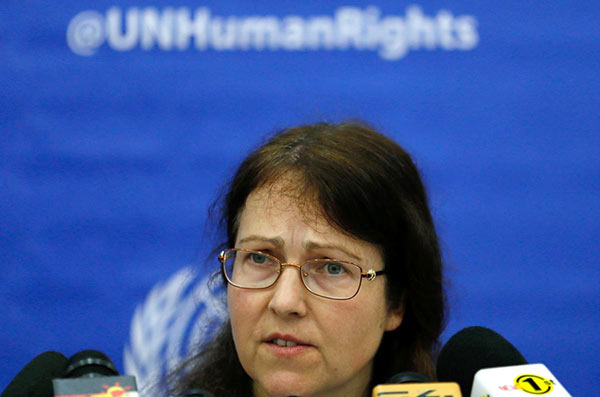U.N. asks urgent reforms to end arbitrary detention in Sri Lanka

The United Nations on Friday urged the Sri Lankan government to urgently implement reforms to end war-time arbitrary detention and strengthen independent monitoring of tough legislation.
Sri Lanka has used the 1979 Prevention of Terrorism Act (PTA) to pursue a tough line to prevent aiding and abetting terrorism in the island nation’s long conflict with Tamil Tiger rebels.
That legislation gives wide powers to police to arrest a suspect without informing the immediate family, restricts access to lawyers and allows detention of up to 18-months without charging.
The war ended in 2009, but the government has not repealed PTA, though it had promised to end arbitrary detentions.
Many ethnic minority Tamils who have been arrested under the PTA have complained of years of detention without being charged.
The U.N. is now asking Sri Lanka to repeal the draconian law and introduce an internationally acceptable law.
The government says it has begun moves to replace the PTA and is in the process of introducing new legislation.
“There are no effective safeguards against arbitrariness in this context and there is an urgent need to strengthen mechanisms for independent monitoring and oversight,” Leigh Toomey, a member of the UN working group on arbitrary detention told reporters in Colombo after concluding a 11-day mission.
She said they had identified significant challenges to the right of personal liberty in Sri Lanka, resulting in arbitrary detention across the country.
The Working Group also said their attention had been drawn to a loss of liberty among the socially vulnerable, such as children, women, elderly people, people with psycho-social problems and the poor.
Sri Lanka is under criticism from the rights groups over its slow progress on the commitments it made to the UN human Rights council following a U.N. resolution that called for post-war reconciliation and an investigation of all alleged war crimes.
Sri Lanka ended a 26-year-civil war crushing the separatist Liberation Tigers of Tamil Eelan in 2009. The United Nations and rights groups have accused the military of killing thousands of civilians, mostly Tamils, during the final weeks of the conflict.
The Tamil Tigers were also accused of widespread abuses during the war, such as using child soldiers and targeting civilians with suicide bombers.
In November European lawmakers said they were disappointed about Sri Lanka’s slow roll-out of human rights reforms that it had promised in exchange for trade concessions.
A U.N. rights watchdog in 2016 called on Sri Lanka to investigate documented allegations of torture and rape of detainees by security forces and to rein in broad police powers.
The U.N. Committee against Torture described continuing reports of abductions, deaths in custody, poor conditions of detention and the use of forced confessions in court.
(Reuters)
Latest Headlines in Sri Lanka
- Drug kingpin ‘Wele Suda’ and associates sentenced for money laundering January 15, 2025
- 12-hour water cut in Colombo tomorrow January 15, 2025
- Motorcycle gunmen open fire on house in Dodangoda January 15, 2025
- Sri Lanka to launch Digital National Identity Cards in January 2025 January 14, 2025
- President Dissanayake receives warm welcome upon arrival in Beijing for state visit January 14, 2025



If there is no orger not necessarily law waht prevails is a state of anarchism perhaps something that need to be experimented with something that certain elements will readily exploit to invoke something the likes of a totalitarian system that prabhakara had in mind. To achieve this end he and his followers resorted to intimidation with force that led to a major confrontation and the government had no option but to take up the challenge and vidicated the half baked prbhakaran gangster ideology!. His followers both within and outside continues to enetertain the romantic prabhkaran ideology.
terrorist acts are covert and when it becomes a collective enterprise where the terrorist operate under the cover of the population it is impossible to identify terrorist elements and the only means to keep the lid on is to enact legislation to meet the situation. If the population at large is aware of the law then it is not arbitary!
Further Sri Lankan police on routine patrols do not carry firearms and the ratio of population to the police would be something in the order of 1:1000 or even more. So the unarmed police cannot by any stretch of imagination can execute arbitary arrests. UN ought to as opposed to speculate ought to act with greater precsion than go on a withchunt.
Ms Leigh Tooney’s unqualified acadeic record and her experience is such that she need to be taken by us seriously for iam ure her reprots would never go beoynd her desk for they do not go beyond empirical observations
These persons are UN’s Public Servants, similar to our own glorious Public Servants.
Sri Lankan Public Servants are known for focusing only on their entitlements and perks to make a quick buck. Go to any Sri Lankan School at opening and closing times and you will be shocked to the number of marked and unmarked Govt cars being used to transport children.
Likewise, these UN Public Servants work for their perks including foreign travel at UN expense. The comments they make overseas is simply a means to justify their overseas jaunt and holiday by the sea, all free of charge.
The UN is a bloody waste of time and money.
There are also Heads of State who visit the annual UN sessions in NY with an entourage of over 100 to address an empty assembly. Shame on all.
The UN should be abolished.